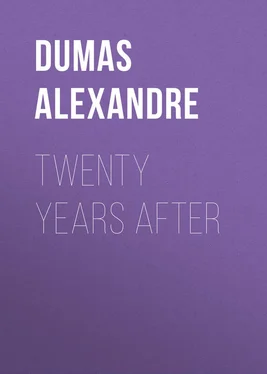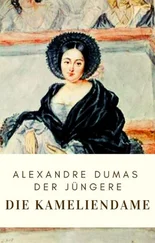Alexandre Dumas - Twenty Years After
Здесь есть возможность читать онлайн «Alexandre Dumas - Twenty Years After» — ознакомительный отрывок электронной книги совершенно бесплатно, а после прочтения отрывка купить полную версию. В некоторых случаях можно слушать аудио, скачать через торрент в формате fb2 и присутствует краткое содержание. Жанр: literature_19, foreign_antique, foreign_prose, на английском языке. Описание произведения, (предисловие) а так же отзывы посетителей доступны на портале библиотеки ЛибКат.
- Название:Twenty Years After
- Автор:
- Жанр:
- Год:неизвестен
- ISBN:нет данных
- Рейтинг книги:5 / 5. Голосов: 1
-
Избранное:Добавить в избранное
- Отзывы:
-
Ваша оценка:
- 100
- 1
- 2
- 3
- 4
- 5
Twenty Years After: краткое содержание, описание и аннотация
Предлагаем к чтению аннотацию, описание, краткое содержание или предисловие (зависит от того, что написал сам автор книги «Twenty Years After»). Если вы не нашли необходимую информацию о книге — напишите в комментариях, мы постараемся отыскать её.
Twenty Years After — читать онлайн ознакомительный отрывок
Ниже представлен текст книги, разбитый по страницам. Система сохранения места последней прочитанной страницы, позволяет с удобством читать онлайн бесплатно книгу «Twenty Years After», без необходимости каждый раз заново искать на чём Вы остановились. Поставьте закладку, и сможете в любой момент перейти на страницу, на которой закончили чтение.
Интервал:
Закладка:
The road was long, but the horses upon which D’Artagnan and Planchet rode had been refreshed in the well supplied stables of the Lord of Bracieux; the master and servant rode side by side, conversing as they went, for D’Artagnan had by degrees thrown off the master and Planchet had entirely ceased to assume the manners of a servant. He had been raised by circumstances to the rank of a confidant to his master. It was many years since D’Artagnan had opened his heart to any one; it happened, however, that these two men, on meeting again, assimilated perfectly. Planchet was in truth no vulgar companion in these new adventures; he was a man of uncommonly sound sense. Without courting danger he never shrank from an encounter; in short, he had been a soldier and arms ennoble a man; it was, therefore, on the footing of friends that D’Artagnan and Planchet arrived in the neighborhood of Blois.
Going along, D’Artagnan, shaking his head, said:
“I know that my going to Athos is useless and absurd; but still I owe this courtesy to my old friend, a man who had in him material for the most noble and generous of characters.”
“Oh, Monsieur Athos was a noble gentleman,” said Planchet, “was he not? Scattering money round about him as Heaven sprinkles rain. Do you remember, sir, that duel with the Englishman in the inclosure des Carmes? Ah! how lofty, how magnificent Monsieur Athos was that day, when he said to his adversary: ‘You have insisted on knowing my name, sir; so much the worse for you, since I shall be obliged to kill you.’ I was near him, those were his exact words, when he stabbed his foe as he said he would, and his adversary fell without saying, ‘Oh!’ ‘Tis a noble gentleman-Monsieur Athos.”
“Yes, true as Gospel,” said D’Artagnan; “but one single fault has swallowed up all these fine qualities.”
“I remember well,” said Planchet, “he was fond of drinking-in truth, he drank, but not as other men drink. One seemed, as he raised the wine to his lips, to hear him say, ‘Come, juice of the grape, and chase away my sorrows.’ And how he used to break the stem of a glass or the neck of a bottle! There was no one like him for that.”
“And now,” replied D’Artagnan, “behold the sad spectacle that awaits us. This noble gentleman with his lofty glance, this handsome cavalier, so brilliant in feats of arms that every one was surprised that he held in his hand a sword only instead of a baton of command! Alas! we shall find him changed into a broken down old man, with garnet nose and eyes that slobber; we shall find him extended on some lawn, whence he will look at us with a languid eye and peradventure will not recognize us. God knows, Planchet, that I should fly from a sight so sad if I did not wish to show my respect for the illustrious shadow of what was once the Comte de la Fere, whom we loved so much.”
Planchet shook his head and said nothing. It was evident that he shared his master’s apprehensions.
“And then,” resumed D’Artagnan, “to this decrepitude is probably added poverty, for he must have neglected the little that he had, and the dirty scoundrel, Grimaud, more taciturn than ever and still more drunken than his master-stay, Planchet, it breaks my heart to merely think of it.”
“I fancy myself there and that I see him staggering and hear him stammering,” said Planchet, in a piteous tone, “but at all events we shall soon know the real state of things, for I imagine that those lofty walls, now turning ruby in the setting sun, are the walls of Blois.”
“Probably; and those steeples, pointed and sculptured, that we catch a glimpse of yonder, are similar to those that I have heard described at Chambord.”
At this moment one of those heavy wagons, drawn by bullocks, which carry the wood cut in the fine forests of the country to the ports of the Loire, came out of a byroad full of ruts and turned on that which the two horsemen were following. A man carrying a long switch with a nail at the end of it, with which he urged on his slow team, was walking with the cart.
“Ho! friend,” cried Planchet.
“What’s your pleasure, gentlemen?” replied the peasant, with a purity of accent peculiar to the people of that district and which might have put to shame the cultured denizens of the Sorbonne and the Rue de l’Universite.
“We are looking for the house of Monsieur de la Fere,” said D’Artagnan.
The peasant took off his hat on hearing this revered name.
“Gentlemen,” he said, “the wood that I am carting is his; I cut it in his copse and I am taking it to the chateau.”
D’Artagnan determined not to question this man; he did not wish to hear from another what he had himself said to Planchet.
“The chateau!” he said to himself, “what chateau? Ah, I understand! Athos is not a man to be thwarted; he, like Porthos, has obliged his peasantry to call him ‘my lord,’ and to dignify his pettifogging place by the name of chateau. He had a heavy hand-dear old Athos-after drinking.”
D’Artagnan, after asking the man the right way, continued his route, agitated in spite of himself at the idea of seeing once more that singular man whom he had so truly loved and who had contributed so much by advice and example to his education as a gentleman. He checked by degrees the speed of his horse and went on, his head drooping as if in deep thought.
Soon, as the road turned, the Chateau de la Valliere appeared in view; then, a quarter of a mile beyond, a white house, encircled in sycamores, was visible at the farther end of a group of trees, which spring had powdered with a snow of flowers.
On beholding this house, D’Artagnan, calm as he was in general, felt an unusual disturbance within his heart-so powerful during the whole course of life are the recollections of youth. He proceeded, nevertheless, and came opposite to an iron gate, ornamented in the taste of the period.
Through the gate was seen kitchen-gardens, carefully attended to, a spacious courtyard, in which neighed several horses held by valets in various liveries, and a carriage, drawn by two horses of the country.
“We are mistaken,” said D’Artagnan. “This cannot be the establishment of Athos. Good heavens! suppose he is dead and that this property now belongs to some one who bears his name. Alight, Planchet, and inquire, for I confess that I have scarcely courage so to do.”
Planchet alighted.
“Thou must add,” said D’Artagnan, “that a gentleman who is passing by wishes to have the honor of paying his respects to the Comte de la Fere, and if thou art satisfied with what thou hearest, then mention my name!”
Planchet, leading his horse by the bridle, drew near to the gate and rang the bell, and immediately a servant-man with white hair and of erect stature, notwithstanding his age, presented himself.
“Does Monsieur le Comte de la Fere live here?” asked Planchet.
“Yes, monsieur, it is here he lives,” the servant replied to Planchet, who was not in livery.
“A nobleman retired from service, is he not?”
“Yes.”
“And who had a lackey named Grimaud?” persisted Planchet, who had prudently considered that he couldn’t have too much information.
“Monsieur Grimaud is absent from the chateau for the time being,” said the servitor, who, little used as he was to such inquiries, began to examine Planchet from head to foot.
“Then,” cried Planchet joyously, “I see well that it is the same Comte de la Fere whom we seek. Be good enough to open to me, for I wish to announce to monsieur le comte that my master, one of his friends, is here, and wishes to greet him.”
“Why didn’t you say so?” said the servitor, opening the gate. “But where is your master?”
“He is following me.”
Читать дальшеИнтервал:
Закладка:
Похожие книги на «Twenty Years After»
Представляем Вашему вниманию похожие книги на «Twenty Years After» списком для выбора. Мы отобрали схожую по названию и смыслу литературу в надежде предоставить читателям больше вариантов отыскать новые, интересные, ещё непрочитанные произведения.
Обсуждение, отзывы о книге «Twenty Years After» и просто собственные мнения читателей. Оставьте ваши комментарии, напишите, что Вы думаете о произведении, его смысле или главных героях. Укажите что конкретно понравилось, а что нет, и почему Вы так считаете.


![О Генри - Через двадцать лет [After Twenty Years]](/books/415401/o-genri-cherez-dvadcat-let-after-twenty-years-thumb.webp)









